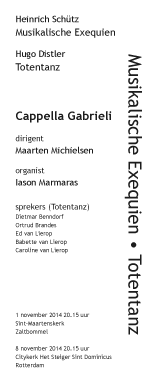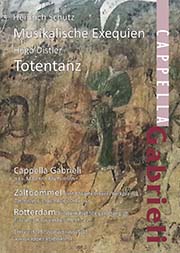Totentanz
8:15 pm, Saturday, 1 November 2014
Sint-Maartenskerk, Kerkplein 1, Zaltbommel (map)
8:15 pm, Saturday 8 November 2014
Citykerk Het Steiger Sint Dominicus,
Hang 18, 3011 GG, Rotterdam
(map).
Entrance: €18
We will sing Heinrich Schütz’ Musikalische Exequien (1636) and Hugo Distler’s Totentanz (1934), two works that are closely linked, each philosophising about life and death in its own way.
In 1844, a mural was discovered in St Martin’s church in Zaltbommel that portrays the medieval legend of the Danse Macabre. The images were intended to remind churchgoers of the fragility and transience of earthly existence. ‘This is exactly the message that the Musikalische Exequien and Totentanz express’, says director Maarten Michielsen. ‘That's why we chose Saint-Martin’s church. The mural is a beautiful backdrop for this concert.’
Schütz was commissioned to compose the Musikalische Exequien by his compatriot Von Reuß. The German count wanted music for his funeral. He and Schütz ordered a copper coffin and had it decorated with their choices of Bible and hymn verses, based on the themes of death, mortality, resurrection and eternal life. These texts formed the basis for the Musikalische Exequien, the first funeral mass to be performed in German, instead of Latin.
The Musikalische Exequien inspired Distler to compose his Totentanz. Like Schütz, he searched for new ways to set liturgy and biblical texts to music. The Totentanz consists of four-part ‘Spruchmotetten', performed by the choir, interspersed with spoken dialogues with Death with a series of characters played by actors.
During the performance of the Totentanz in Rotterdam a series of images selected by choir members will be projected. ‘I have asked the choir to use free association and look for images that they relate to the themes of the piece we will be singing. Because everyone will have their own associations when seeing the images, our rendition of Distler's Totentanz will be experienced differently by each listener’, says conductor Michielsen. ‘We are very curious about the reactions of the audience’, he adds.
Programme
Heinrich Schütz (1585 – 1672):
Musikalische Exequien
Hugo Distler (1908 - 1942):
Totentanz

